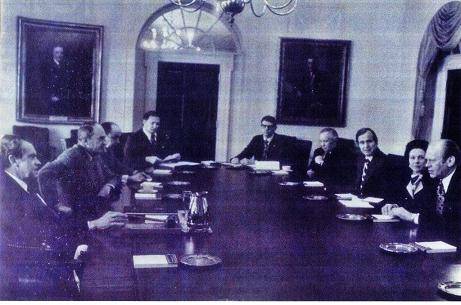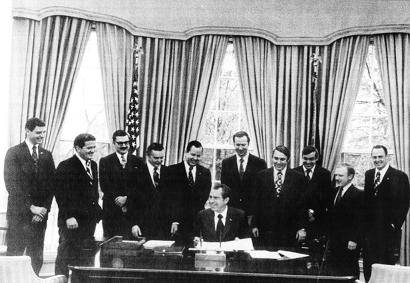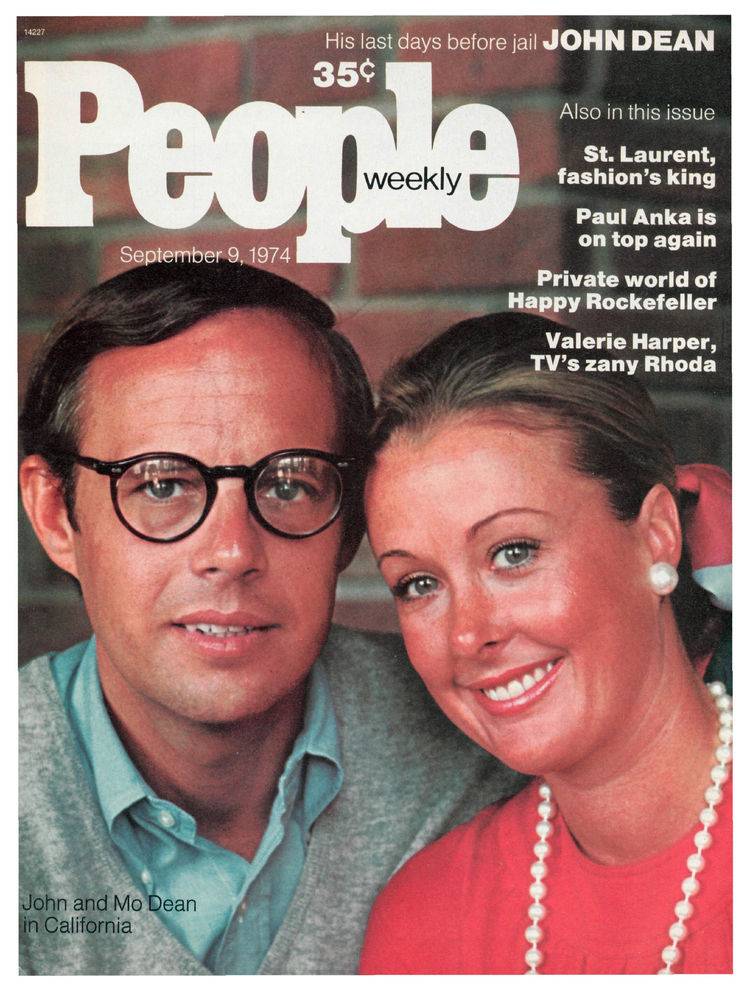 Sometime around midnight on June 16, 1972 a small team of CIA-trained spies infiltrated the Democratic National Committee on the sixth floor of the Watergate Hotel and Office Building.
Sometime around midnight on June 16, 1972 a small team of CIA-trained spies infiltrated the Democratic National Committee on the sixth floor of the Watergate Hotel and Office Building.
38 years later, it still seems like a weird thing to do. Author Geoff Shepard points out that campaign intelligence long-ago determined that you’d not find much intersting stuff in a committee office.
So why did they do it? And how the hell did such a stupid endeavor bring down a presidency?
Maybe we’ll find out in 2024, when investigative documents de-classify. Until then, the Publishing About Watergate industry continues to churn out volumes of conspiracy theory.
Two years ago Nixon-staffer Geoff Shepard published his conclusions in The Secret Plot to Make Ted Kennedy President.
The book suffered a huge disadvantage, for publicity purposes: It came out right as the world discovered Ted Kennedy’s terminal brain tumor.
Secret Plot’s major advantage is that it promotes a wildly outlandish theory, and then provides the lucid analysis to support that theory, thus rendering it landish.
The book is now available on audio from Audible and the Lincoln Trails MediaMall (Champaign Public and Urbana Free libraries, among others).

Geoff Shepard (wearing glasses) explains the President’s proposals for campaign reform to the Nixon Domestic Council, 1974. Also attending: Attorney General William Saxby; Bryce Harlow, Counselor to the President; Bill Timmons, Assistant to the President for Congressional Relations; George H. W. Bush and Anne Armstrong, Republican National Committee; Vice President Gerald Ford.
I asked Mr. Shepard a few questions about it.
SP: How long did it take you to compile and collate everything?
GS: I was a member of Nixon’s White House staff for over five years, first as a White House Fellow and then as a member of the Domestic Council, where my public policy responsibilities focused primarily on the Department of Justice. I knew and had worked with virtually all the major Watergate players. I also became principal deputy to Fred Buzhardt, Nixon’s Watergate defense counsel. In that regard, I transcribed the White House tapes (I’m the real ‘expletive deleter’); ran the Document Rooms holding the seized files of John Ehrlichman, Bob Haldeman and John Dean; and briefed the senior staff on developments. As you may have heard, it all ended rather badly. I was in the East Room when Nixon announced his resignation and on the South Lawn when his helicopter took off. I was a Government witness in the Plumbers Trial and was subpoenaed for the same purpose in the Watergate Cover-up Trial.
It has never been my view that the public was provided any real insight into what had actually happened, but I chose to leave Washington and pursue my legal career. In 2002, however, I realized the truth about Watergate had not only not come out, it was unlikely to come out because most of principal players had died. I decided to set out my own version of events based mainly on my own recollections and documents. I discovered, however, that the Special Prosecutor’s files were becoming available for review at the National Archives. They are housed in what is called the Special Access section, which also contains the Kennedy Assassination papers and the Clinton Impeachment papers, and are run like a ‘closed stack’ research library: you have access to something like a Card Catalogue, but are not allowed to simply rummage through the stacks themselves. In essence, you have to ask for a document by name before the Archivists will go look for it. Since I had lived through the scandal from the inside, I had a much better idea of what I wanted to see and could be fairly specific. I ended up spending hundreds of hours reviewing and copying documents-because one item inevitably raised follow up questions that led to other documents.
My book was published in 2008, so it was technically a five year project-but I could never have done the work without having lived through the events themselves-and then mused on them for the intervening 30 years.
SP: Do you have anything nice to say about Ted Kennedy?
GS: Well, sure. Senator Kennedy served the people of Massachusetts ably and well for decades. He functioned quite well as the liberal lion of the Senate. There is no dishonor in his political views; they were just different from mine. In later years, he also displayed a rare ability to reach across the aisle and work with Republicans to achieve bi-partisan support of decent legislation. His attitude became one of, ‘better a half loaf than none at all’ when others in his party really wanted the issue to remain aflame for the next election.
SP: How do you feel about nepotism generally? Bushes, Clintons … Quincy Adamses?
GS: I am really sour on ‘son of’, ‘daughter of’ and ‘spouse of’-in business, in politics, in entertainment. It is an unseeming effort to build on name recognition as a crutch for fundraising. One of America’s key strengths is merit selection and upward mobility. It is one of the main reasons we separated from England.
SP: Do we have a recessive monarchist streak?
GS: No, but we certainly have an adoration gene, most evident in our fantasies about the rich and famous. You not only see it in the adoring coverage of off-spring of prominent public figures, but also in the entertainment industry. I don’t think it is all bad or even so bad that something must be done about it, but I do take great pride in noting that substantially more of the Forbes 400 earned their money rather than inherited it.
I got into Harvard Law School on merit (high LSAT scores at a time when Dean Griswold wanted to diversify the student body) and soon discovered the school was roughly divided between legacy and merit admissions. That seems to have changed over the past forty years to be much more merit oriented. Being a descendant of the British servant class, I think this is a good thing.
You speak of flashy cars, flashy outfits, and the bachelor lifestyle. But you don’t delve into prostitution rings. I just watched the 1992 Bill Kurtis/A&E TV special about Len Colodny, Mo Dean etc.
SP: Do you not subscribe to the idea that John and Mo were involved with upscale escorts?
GS: I tried to confine my research to topics with which I was already familiar and to which I could add something new. The two principal conspiracy books that preceded mine (Secret Agenda and Silent Coup) contained lots of allegations that I didn’t explore or comment upon: possible CIA involvement, the Yeoman Radford/Admiral Welander spy incident, the secreted key to Maxine Well’s desk, etc. I have no way of knowing whether those allegations are true. They were not crucial to my own story. From my perspective, Gordon Liddy led a break-in into DNC headquarters-and several top people (including Dean and Magruder) knew of the idea beforehand and/or received information from it afterwards. Real crimes; real people. Why they did so was not so important to me; that Dean and Magruder got off with barely a slap on their respective wrists in exchange for altered testimony against higher-ups is what I find fascinating. Is it possible the higher-ups (particularly Ehrlichman and Haldeman) were wrongly destroyed, indicted and convicted in a politically-motivated prosecution? I certainly think so and tried to make that case in my book.
SP: Was there much resentment of Dean among the White House’s married, early-to-rise crowd?
GS: By and large, the White House was a fairly serious place to work during the Nixon Administration: both Haldeman and Ehrlichman were Christian Science, meaning they didn’t drink. Senior staff meetings began at 7 a.m. and there was never enough time to get everything done. Weekend work was quite typical. Lots of the young people were unmarried, but weren’t known as party people. John arrived late to the mix and didn’t have all that much to do. Ehrlichman had taken almost all of his associate counsel staff along with him when he became Assistant to the President for Domestic Affairs. In spite of the lofty title (Dean has said, “The title was the best part of the job”), his real responsibilities revolved around reviewing FBI background checks for security clearances and reviewing clemency petitions sent over from the Department of Justice. His Porsche stood out in the parking area-and rolling in around 10 a.m. was particularly troublesome. He didn’t seem to fit in with the rest of the staff, perhaps because he didn’t work on areas of concern to them. He latched on to political intelligence as a unique specialty, which in turn led to the unpleasantness.
It wasn’t just that Dean was not seen at the time as a real member of the team, it also is the feeling that he almost singlehandedly made matters much worse during his orchestration of the Cover-up, where he has admitted he acted as ‘chief desk officer’. As it develops, he had a monumental, undisclosed conflict of interest (i.e.: his presence at two meetings in the Attorney General’s office where Liddy presented his plans for ‘mugging, bugging, kidnapping and prostitution’ — which put Dean at personal risk of prosecution from the very outset) even as he purported to advise others as to how to conduct themselves during the various investigations. He is seen by many from the WH staff as the one who made matters much worse. As such, he is deeply resented today.
A good deal of politics is pure theater. The transformation of John Dean from the easy going party-type recalled by most on the WH staff to the serious scholar with the incredibly precise memory at the Ervin Hearings remains one of the great personal transformations of our time. Interviews with his lawyer, Charles Shaffer, in the 1994 Brian Lapping Associates production, “Watergate,” shown on BBC and the Discovery Channel, describe how this transformation was accomplished. One of the primary reasons for the public release of transcripts of White House tapes in April of 1974 was to show that Dean’s testimony contained any number of critical errors. Indeed, the White House released an itemization of some nineteen instances where his Ervin Committee testimony was either in conflict with or not corroborated by the transcripts themselves. The Special Prosecutor undertook a similar comparison, which also totaled some nineteen instances-some of which were different from those enumerated by the White House. It didn’t really matter, however: the visual image and media commentary had already cemented public opinion.
SP: I never considered, until your book, that 1998 was payback for 1973. Do you think there’s a connection?
GS: I have a PowerPoint slide that tends to show that Watergate created a pattern that exists through today: Each and every time a second term president was faced by a hostile Congress (ie: both Houses controlled by the opposition), nasty partisan investigations were undertaken: Nixon, Reagan, Clinton and Bush II. It may well be a weakness in our ‘non-Parliamentary’ system. If the leader had lost an election in the United Kingdom, the Prime Minister would have been immediately replaced — but in our country, he continues in office for a set term, even if the Congress decides it has won the election and should be running the country. So what I think actually happens is that they use their hearings and investigations to ‘soften up’ the other party in anticipation of the next Presidential election, from which they assume they will emerge victorious.
Thus, I think the Ken Starr/Clinton investigation was a payback for both the Nixon Special Prosecutor and the Reagan Independent Prosecutor investigations. As you may recall, Cap Weinberger, Reagan’s Secretary of Defense, was indicted the week before the 1988 Presidential Election (and then pardoned by Bush I, who won the election anyway).
I would make one additional observation — the public never bought into the Clinton impeachment, but I believe for two separate reasons:
- First, they didn’t like impeaching Clinton over sex. Ken Starr was overly precise in his reading of the Independent Prosecutor statute. He had several investigations going on the Clintons, but concluded the statute required him to inform the House of Representatives immediately upon any conclusion of any impeachable offense (a high crime or misdemeanor). Unfortunately, he reached that conclusion first with regard to Clinton’s perjury in the Jones case. If he had not been quite so quick off the line, the case presented to the House might well have involved more substantive wrong-doing.
- Second, I believe the public felt it had been assured when Nixon was driven from office that the US could change presidents without any residual harm, but in retrospect they felt otherwise (we had lost Vietnam, lost the war on drugs, and elected Jimmy Carter). When the same assurances were made with regard to President Clinton, the public just was not prepared to buy it.
Note also that once the Independent Prosecutor statute had been used against the Democrats, giving them a taste of their own medicine, it was allowed to quietly expire and remains so today. We may have specially selected prosecutors, but they are not likely to be totally independent of the Department of Justice.
SP: Will Congress ever retain its constitutionally endowed powers from the executive branch?
GS: I am and remain an advocate of a strong executive branch. If you read the Federalist papers, you may well conclude they were far more concerned about the Congress taking over than about the Executive. Indeed, one of the best things to come out of the House Impeachment Hearings was a book by John Labovitz (all the research for which was done while he was on the Impeachment Inquiry staff) published by Yale University Press in 1978 entitled Presidential Impeachment. It was used as the ‘impeachment bible’ for the Clinton impeachment. It develops in great detail the concerns of the Founding Fathers over how the Congress might overwhelm the Executive Branch.
The Congress can ‘rant and rave’ and can ‘view with alarm’, but is inherently incapable of running the government. You need only look to the legislation enacted early in the Obama Administration-drafted almost exclusively by Congress, since Obama’s Administration had hardly begun to take shape-to see how it was little more than self-interest pork barrel allotments to the party in power.
I believe virtually all of the Post-Watergate reforms have proven to be totally misguided and ineffectual: the War Powers Act, the walling off of CIA intelligence from the FBI, the Independent Prosecutor statute, the so-called Election Finance Reforms.

SP: Who’s no longer speaking to you?
GS: The research for my book was confined to uncovering documents prepared at the time of the unfolding scandal. I also purchased some three dozen Watergate books — but only those authored by participants — which could be termed primary sources. I am not particularly interested in later opinions from other researchers-or in interviewing major Watergate players to see what they think today. My issues have mainly to do with what they thought and said at the time-whether working on the White House staff, for the Committee to Re-Elect the President, the US Attorney’s office, the Special Prosecutors office, the Ervin Committee or the House Impeachment Inquiry.
Since I didn’t choose to speak with any of the above in writing my book, I cannot say that anyone is no longer speaking to me.
That said, I should mention that I have organized and hosted annual reunions of the Nixon/Ford White House policy planning staffs for the past thirty years. These are primarily staff members from the Domestic Council and Presidential appointees to the Office of Management and Budget-both of which were founded during the Nixon Administration. We also include White House staff members from other units with whom we worked closely on public policy issues, including selected speechwriters, members of the Congressional Relations staff, and some of the President’s Scheduling and Advance units. I sometimes describe the group as ‘those who did not go to jail’ adding, “It’s a small group.” But in point of fact there are still about eighty people from that era who are included on our invitation list.
Who doesn’t get invitations to our reunions? Well, certainly the principal instigators of the scandal: John Dean, G. Gordon Liddy and Jeb Stuart Magruder — plus one or two others who I don’t feel served the President particularly well. I guess you could say that this includes those with whom I’m no longer speaking.
 A FEW WORDS ABOUT JOHN DEAN
A FEW WORDS ABOUT JOHN DEAN
John Dean did not respond to my invitation to comment on Secret Plot. In recent years, John Dean authored a number of books and articles on government. I think some of them are good, and some are misguided.
For example, Worse than Watergate successfully portrays the Bush-Cheney Administration as scoundrels worthy of impeachment and removal. On the other hand Broken Government overstates the same theme. e.g. Dean rebukes the GOP Congress for imposing a two-day work week. But isn’t keeping representatives in their districts, and away from lobbyists, a laudable goal?
In an article about our first African-American president (Warren Harding), Dean cites Barack Obama’s “African-American heritage.” I would argue that Barack Obama has African heritage, and American heritage, but not African-American heritage as the term is colloquially understood.
I draw attention to this usage because it says something about John Dean. It’s weird to employ common terminology differently from the way everyone else employs it. It’s especially weird for an attorney to use terms of art uniquely, unless he specifically intends to skew an argument.
John Dean has taken, and given, a lot of heat over the last 38 years. Maybe he’s the chief Watergate instigator, as Geoff Shepard contends. Maybe we’ll never know.
The lesson I take from this study is that words are important. If the White House counsel has trouble communicating his meaning, or understanding others; everyone will be better served if that counsel is given an inconsequential writing gig.








